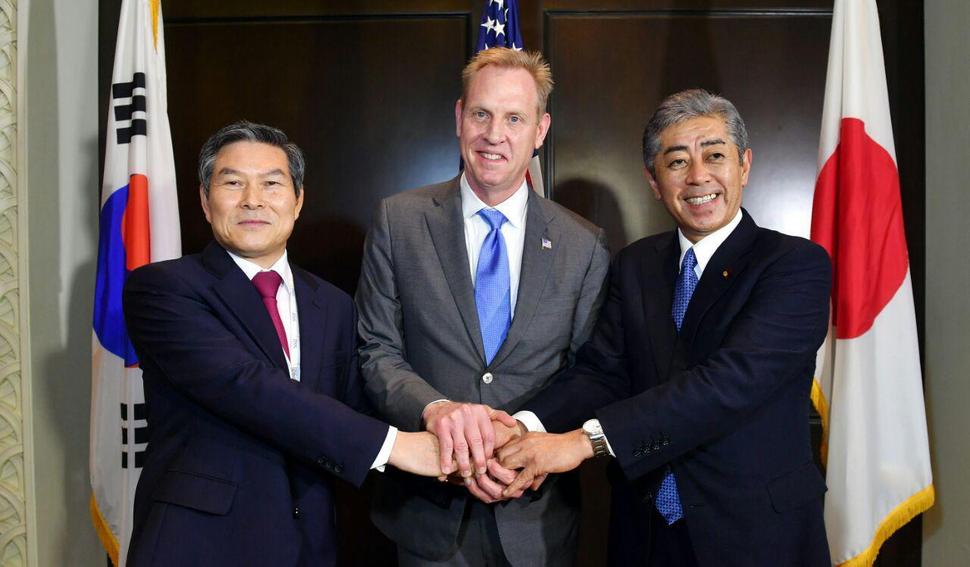 |
|
South Korean Minister of National Defense Jeong Kyeong-doo (left) with Acting US Secretary of Defense Patrick Shanahan and Japanese Defense Minister Takeshi Iwaya in Singapore on June 2. (provided by the Ministry of National Defense)
|
Defense ministers hold trilateral dialogue in Singapore
The top defense officials in South Korea, the US, and Japan have agreed to cooperate closely to support diplomatic efforts to achieve the complete denuclearization of the Korean Peninsula and to bring about a lasting peace. These officials also voiced the need for a “rules-based order” and reconfirmed their view that the freedom of navigation and flight should be guaranteed. That was the message of the joint press statement issued by South Korean Defense Minister Jeong Kyeong-doo, Japanese Defense Minister Takeshi Iwaya, and Acting US Defense Secretary Patrick Shanahan following deliberations about Korean Peninsula and regional affairs. The deliberations were held on June 2 at Singapore’s Shangri-La Hotel, which is currently hosting the 18th Asia Security Summit, also called the Shangri-La Dialogue. The content of this joint press statement was similar to what was discussed between South Korea, Japan, and the US in their Defense Trilateral Talks (DTT), which were held in Seoul on May 9. This shows that the three countries’ approach to denuclearization remains the same even after North Korea’s missile launch. During the trilateral dialogue, South Korea, Japan, and the US have consistently emphasized achieving denuclearization through diplomacy. “It’s important to be flexible on military matters so that [the North Korean nuclear issue] can be resolved diplomatically,” said Jeong, during a speech in the main summit on June 1. Shanahan said that the US is focusing on negotiations to bring about the final and fully verified denuclearization of the Korean Peninsula. While mentioning the North Korea-US summit, Iwaya said that dialogue between the two countries had kindled hopes and raised expectations. The defense chiefs noted the importance of trilateral military confidence-building in connection with regional security and agreed to strengthen cooperation aimed at creating institutions to support such confidence-building. This is interpreted to mean that trilateral cooperation will be strengthened in line with the US’ strategic objective of achieving a “free and open Indo-Pacific.” In his opening remarks before the meeting, Shanahan described the three countries as dynamic and powerful forces for democracy in the Pacific and said that the US would continue to prioritize a trilateral body for deliberation and would further strengthen cooperation. During a bilateral meeting on Saturday, South Korea and Japan agreed to normalize defense cooperation, which has been frozen because of a dispute over a Korean ship that aimed its fire-control radar at a Japanese patrol plane that made a close flyby. This agreement is also thought to be part of strengthening cooperation between the three countries. In their meeting on Sunday, Jeong and Iwaya both expressed the importance of quickly dealing with pending issues to maintain and strengthen a stable security environment in Northeast Asia and agreed to continue working-level deliberations toward that end. “We shared our candid opinions about the threatening flyby by the Japanese patrol plane. We reached an agreement to cooperate closely and to take measures to prevent such an incident from occurring again in the future,” Jeong said after the meeting. The next question is how strengthening cooperation between South Korea, the US, and Japan will affect South Korea-China relations. Some have argued that increasing trilateral cooperation could put China on its guard. During a meeting the previous day between Jeong and Chinese Defense Minister Wei Fenghe, the two countries discussed security matters in the region, including the Korean Peninsula, and agreed to bolster their strategic communication. While the THAAD issue also came up during this meeting, the two sides reportedly didn’t go beyond expressing their understanding for each other’s position. By Yoo Kang-moon, senior staff writer Please direct comments or questions to [english@hani.co.kr]





